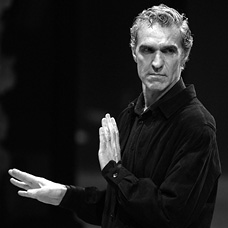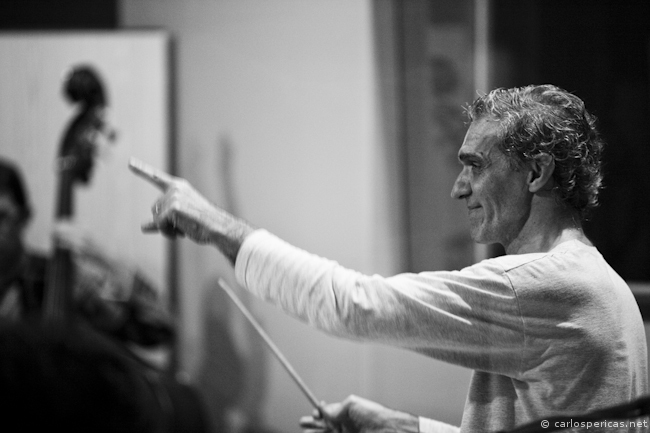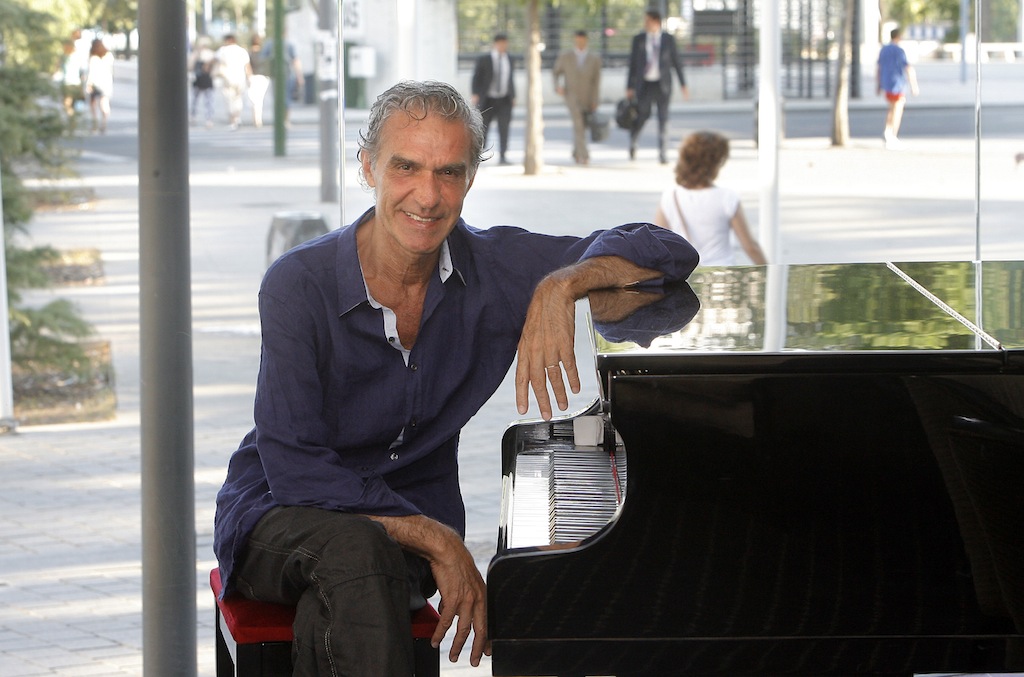Joan Albert Amargós
Contemporary music
(Joan Albert Amargós, Barcelona 1950)
Composer, pianist, clarinettist, music arranger and conductor, his powerful aesthetics are of the richest on the Catalan music scene. His main goal has been a connection with the audience, rather than experimentalism or aesthetic speculation, and this has led him to use a wide range of genres, especially jazz and flamenco.
Trained at the Liceu Conservatory in Barcelona, his beginning as an artist is highly influenced by composers such as Henze, Hindemith and Berio, in a both formal and conceptual way. Their influence can be found in his early compositions Sis cançons d’homenatge a Picasso (1971), Le cheval de Malval (1976) or even in the Sonata para flauta y piano (1979), for which he won first place in the contest of Joves Compositors de Joventuts Musicals de Barcelona.
In 1975, with bassist Carles Benavent, he started up the celebrated jazz fusion group called Música Urbana and they recorded two albums: «Música Urbana» (1977) and «Iberia» (1978). His interest in this genre has stayed with him all along and this can be clearly heard in his work, from Hasta siempre Jaco (1998) for big band, to Homenatge a Michael Brecker (2008). This last piece was made into a concert for alto saxophone that he conducted on its opening night on April 13, 2008, with Albert Julià on saxophone and the Orquestra de Cambra de Granollers, which was his way of trying to establish a dialogue with the world of jazz and the world of symphony. His even closer connection to flamenco has also been another long path taken. This began with the symphony orchestra piece done for the National Ballet of Spain,Tarantos (1985), and that reaches a high point with Paisajes sonoros de España (2009), a concert for two pianos and orchestra, directly inspired by Spanish folklore music. The piece was written by two sisters, Katia and Marielle Labèque, which premiered at the Auditorio Nacional de Madrid on April 9, 2010, during the concert season of the Orquesta Nacional de España (ONE), conducted by Josep Pons. Few months later on that same stage, on November 26, the ONE offered a new premiere, Siete canciones españolas (2010), by the cantaora (mezzo) Estrella Morente leading the orchestral symphony and Josep Pons again as the conductor.
His catalogue includes other orchestral creations where the author also manifests his interest in giving a voice to instruments that are not traditionally played solo. Hence, in 1995, with the clarinettist Walter Boeykens leading, he wrote his brilliant Concierto para clarinete y orquesta, which the Orquestra de Cambra Teatre Lliure premiered on June 7, 1995, at the Centre de Cultura Contemporània de Barcelona, with Josep Pons conducting. Shortly after, the clarinettist Isaac Rodríguez presented the version for a symphony orchestra at the Teatro Monumental in Madrid, with the Orquesta de la RTVE conducted by Tamas Vasary. Amargós also wrote Concierto del Sur (1986) for violin, cello and chamber orchestra, also performed by the Orquestra de Cambra Teatre Lliure, with Lluís and Gerard Claret as soloists. In March 2001, Concert per a trombó baix i orquestra (2000), commissioned by the Valencia-born trombonist Raúl García, was premiered by the Orquestra Simfònica de Barcelona i Nacional de Catalunya (OBC), and conducted by the Brit Gilbert Varga. Other pieces are Obertura per a deixalles reciclades i orquestra, commissioned by the Orquestra Simfònica del Vallès and premiered in March 2009, and Jocs Temàtics, for a concert band, premiered by the Banda Municipal de Barcelona on February 20, 2011.
For vocals, he has written pieces such as: Cantata de la terra (1993) for choir, soloists and an orchestra; Requiem (1994); Mil·lenarium (2003); the youth cantata L’assemblea dels infants (2004), and two chamber operas, both premiered by the group Barcelona 216 with Amargós himself conducting; in 2001, Eurídice (Eurídice y los títeres de Caronte), at the Convent dels Àngels de Barcelona, and in 2007, El saló d’Anubis o l’Acadèmia de Lilí & Danté, at the Teatre Nacional de Catalunya. The last three pieces include a libretto by Toni Rumbau. Furthermore, Amargós has written compositions for two pianos and vocals dedicated the Labèque sisters and to the cantaora Mayte Martín for an international tour and a subsequent album recording «De fuego y de agua». He is also the author of the song series Bestiari (2008) for mixed choir and clarinet, based on the work of the poet Josep Carner with the same title and premiered in Barcelona by the Cor de Cambra del Palau de la Música Catalana on February 27, 2010.
As well as writing numerous scores for cinema, theatre and television, Amargós is an eminent arranger, working with a wide range of artists, from classic vocalists Montserrat Caballé, Plácido Domingo and Alfredo Kraus to celebrated figures in the world of pop music. Within this sphere, he was in charge of the orchestration for the opening ceremony of the World Swimming Competition, celebrated in Barcelona in July 2013.
Over the past few years, there has been much a demand for him to bring other genres to orchestral symphony. A creative venture that began in 2000 with the flamenco cantaor Miguel Poveda, with whom he still closely collaborates, was the show Flamenco en orquestra, a proposal that spurred performances by the ONE, the OBC, the Orquesta de Málaga and the Malmö Symphonic (Sweden). This was then recorded onto the album «Cante i orquestra» (2009), with the Simfonietta Porta Ferrada and the Tangencial Taller de Músics. Still immersed in flamenco, with the guitarist José Fernández Torres (better known as Tomatito), he prepared the arrangements and the orchestration for «Sonanta suite», conducted by Josep Pons. This score was later recorded on Deutsche Grammophon by the Orquesta Nacional de España, which is the first time ever this label released the work of a flamenco artist. Finally there is his collaboration with the singer/songwriter Joan Manuel Serrat, for whom he has orchestrated classic songs from his repertoire as featured in the album «Serrat Sinfónico» (2003).
In 2002, the Generalitat de Catalunya awarded him with the National Music prize for his “ability to combine diverse musical languages” and the Academia de las Artes y las Ciencias de la Música named him the Best Music Arranger every year on from 2000. What has been even more remarkable is his nomination for a Grammy in 2007 in the category of Best Contemporary Classical Composition, for Northern Concerto (2005), for flute and orchestra, recorded on the album «Movements» (OUR Recordings, 2007) by the Danish recorder player Michala Petri –to whom it is dedicated– and the Danish National Symphony Orchestra, conducted by Lan Shui. In 2011, he additionally recorded his first album of the flute version of this score, performed by the young flutist from Salamanca and soloist from the Hessicher Rundfunk de Frankfurt, Clara Andrada, and the Orquesta Sinfónica de Castilla y León.






 twitter
twitter flickr
flickr facebook
facebook RSS
RSS spotify
spotify youtube
youtube
